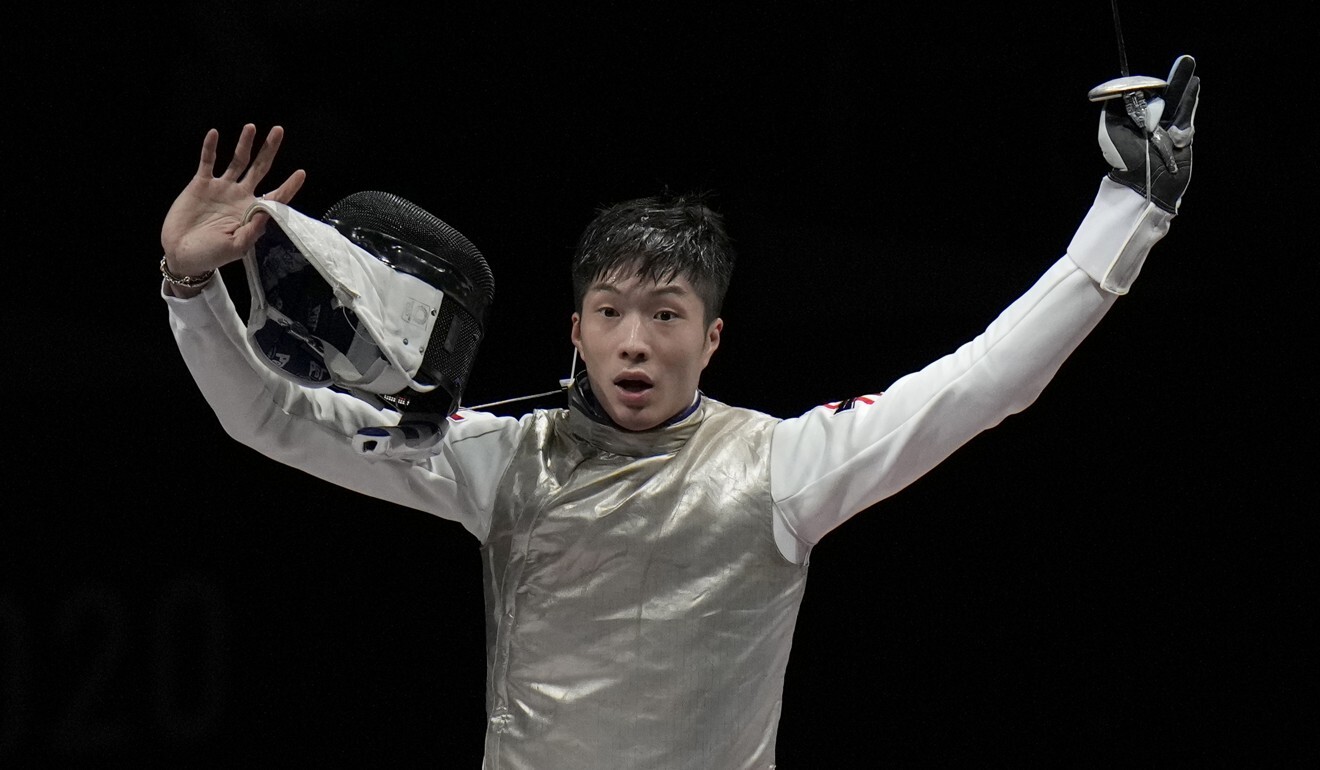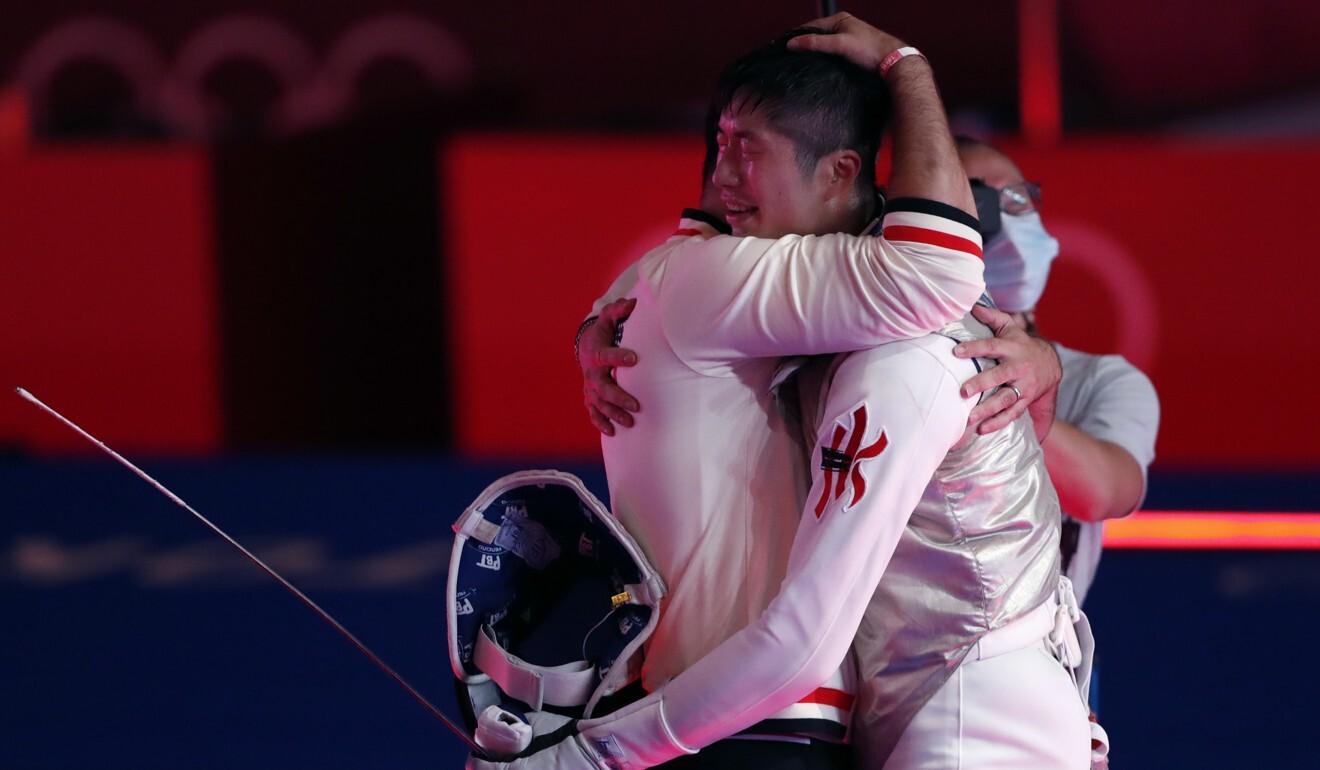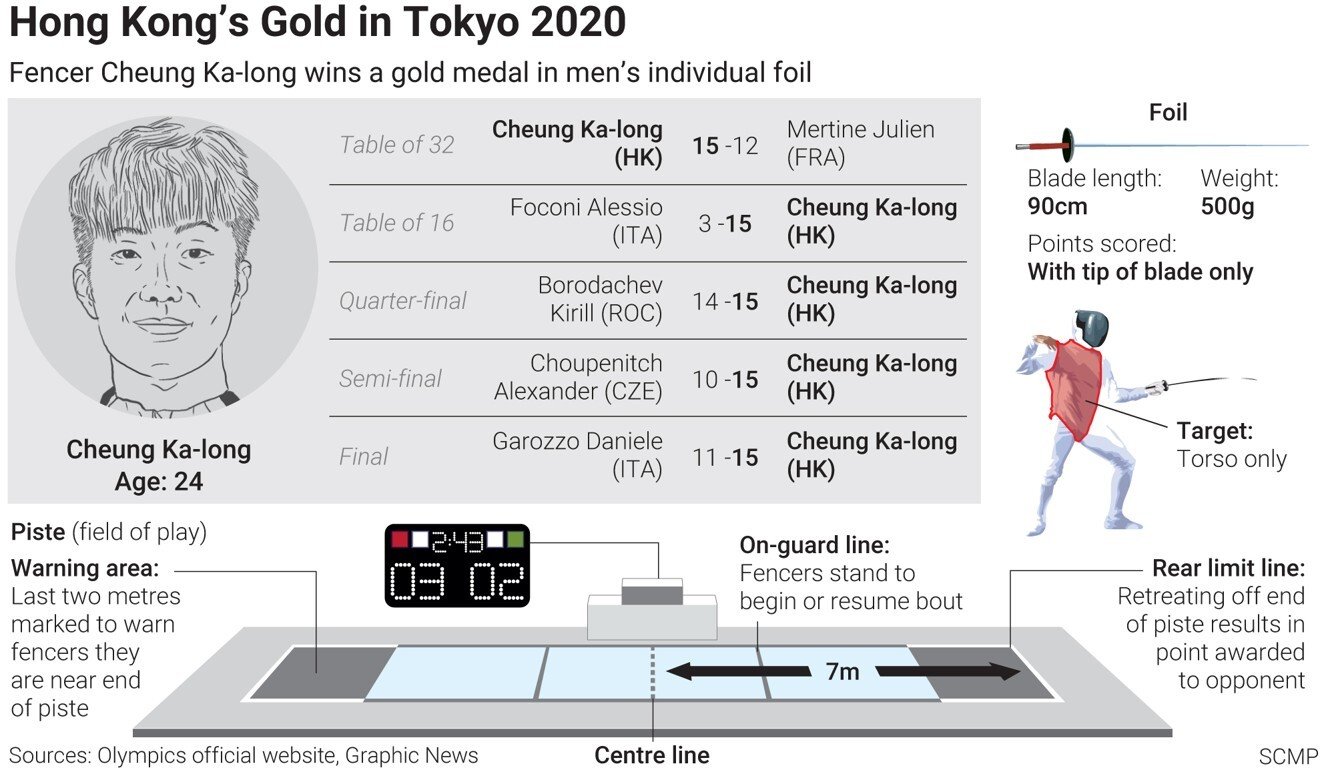
Tokyo Olympics: Cheung Ka-long makes history for Hong Kong with fencing gold
- ‘I beat an Olympic champion to become an Olympic champion. Before the draw was made, I knew I might meet him,’ says 24-year-old
- Chief Executive Carrie Lam praises his ‘composure and fighting spirit’, while 1996 heroine Lee Lai-shan is ‘so happy there is finally another gold medallist’
Cheung, 24, can now lay claim to being the finest foil fencer in the world after destroying the defending Olympic champion, Italy’s Daniele Garozzo, in an incredible run to the top of the podium.
Hong Kong have won only two other Olympic medals – a silver for Li Ching and Ko Lai-chak in the men’s table tennis doubles at the 2004 Athens Olympics and track cyclist Sarah Lee Wai-sze’s bronze in the keirin at the 2012 London Games. The 34-year-old Lee is a leading medal hope in the sprint and keirin in Tokyo next week.
“I beat an Olympic champion to become an Olympic champion!” Cheung said. “Before the draw was made, I knew I might meet him. I joked then with my coach that if I could beat an Olympic champion, I should call myself an Olympic champion.”

“He lost to a left-hander recently and I watched the footage to study and beat him,” Cheung said.
“This medal came a bit fast. I never thought I could win a gold medal today … even a silver medal would have been a surprise.”
Asked if he is prepared for superstar status back in Hong Kong, Cheung said: “Luckily, I’m going straight to China [to compete at the National Games] so I can avoid it all. I’m a very shy person.”

05:59
Hong Kong’s Cheung Ka-long clinches Olympic gold in historic win at Tokyo Games
Chief Executive Carrie Lam Cheng Yuet-ngor was one of the first to congratulate Cheung.
“Like other Hong Kong residents, I have followed closely Cheung’s competitions today through the live broadcast and rooted for him. Cheung’s skills were superb, he remained composed throughout and displayed fighting spirit in times of adversity,” said Lam in a statement.
Tokyo Olympics: Cheung wins gold - day 3 as it happened
“Ultimately, he made history for Hong Kong. His excellent performance demonstrates the strength of our athletes and has made all of us proud,” she said, wishing luck to the rest of the Hong Kong athletes in Tokyo.
Financial Secretary Paul Chan Mo-po echoed his well wishes on Facebook, saying: “Congratulation to Ka-long for claiming gold … also Hong Kong’s first gold after the handover. Well deserved, the whole of Hong Kong is proud of you!”

Windsurfing queen Lee said: “I am so happy that after 25 years, there is finally another Hong Kong gold medallist. And I hope there is more to come in Tokyo. We are all very proud of Edgar and Hong Kong people should be proud of him.
“I said when I won gold in Atlanta that ‘Hong Kong athletes are not rubbish’, and Edgar has proved that. Not only him but we have so many athletes who work so hard and are top 10 or top 20 in the world and this is something to be proud of.
“Edgar’s gold medal will hopefully boost Hong Kong sport even more and be the start of a new golden generation for Hong Kong athletes.
“I hope his success will convince the authorities to provide more resources to sport in Hong Kong, with more facilities. And I hope this shows parents that there is a future in sports.”

After clinching the 15-11 win, Cheung embraced his coach, Greg Koenig, and finally let his steely mask slip with an outpouring of emotion. “Today he became a man,” declared Koenig afterwards.
Cheung earlier produced an incredible fightback to beat Russian Olympic Committee’s Kirill Borodachev when staring at elimination in the quarter-finals, coming from the brink of defeat at 14-10 down.
“He is much more mature and stable these days,” said Hong Kong head coach Zheng Kangzhao after that victory. “He can control his emotions now. Before, if he was losing by a big margin, he would have just thrown it away. But this time he stayed calm.”

However, Hong Kong swimming star Siobhan Haughey made the start she wanted in the pool on Monday night. The 23-year-old cruised through her heat in the women’s 200m freestyle and into Tuesday morning’s semi-finals.
Haughey, who has been tipped as a medal hope, will also swim in the 50m and 100m free races, as well as the medley relay.
And the mixed doubles duo of Tang Chun-man and Tse Ying-suet held their nerve to beat Germany’s Mark Lamsfuss and Isabel Herttrich to progress to the badminton quarter-finals and a step closer to their dream of an Olympic medal.
“Reaching the quarters, I’m very happy. This is my third time at the Olympics – first win and first time in the quarters in Tokyo – so hard to forget, unbelievable,” said Tse, who also carried the flag for Hong Kong at the opening ceremony. “It’s a major breakthrough.”

Tang said: “Getting into the Olympic Games is difficult and reaching the quarter-finals is unbelievable but what matters more is the experience. I [have] learned from the Olympics. It is different from the tour where pressure always exists but is not as difficult as the Olympics. I thought I could handle pressure but the Olympics is different.”
But there was some disappointment when Ryan Choi Chun-yin, the Hong Kong No 1, went down to Asian Championship gold medallist Takahiro Shikine.
“I was aggressive from the beginning and expected him to be the same as he is always aggressive,” Choi said. “But today he stayed calm and watched me from outside.
“I made a lot of mistakes. Though I made a lot of attempts, I could not find the target. I am not good enough and need more training to improve.”
After a gold rush on the opening two days winning six events, China hit a brick wall with two of its big favourites beaten and a potential clean sweep in the diving already in the bin.
Two-time gold medallists Chen Aisen and Cao Yuan suffered a surprise defeat to Great Britain’s Tom Daley and Matty Lee in the men’s synchronised 10m platform event.
At the end of day, hosts Japan topped the medal table on eight golds, ahead of the USA with seven and China with six.
Meanwhile, 16 more people connected to the Games have tested positive for Covid-19, including three athletes from overseas, bringing the total since the beginning of this month to 148, organisers said on Monday, according to Kyoto.
The three athletes were not staying at the athletes’ village. The other 13 are eight Games-related officials, one of whom was living in the village, four contractors and a member of the organising committee. Of the 16, 10 were from overseas.

